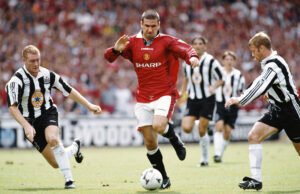On Sunday, Bayer Leverkusen beat Werder Bremen 5-0 and, by so doing, wrapped up their first ever Bundesliga title. Five times before they had been runners-up — four times in the six seasons from 1996-97 when they drew the nickname Neverkusen — but under Xabi Alonso they have been by far the best team in Germany this season.
This is, however, more than a story about a triumphant underdog. It raises the question: why is such a victory not more common? How has football, the great universal phenomenon, become a sport in which only a tiny handful of clubs can win? It’s not just in Germany, where Bayern Munich had won the previous 11 league titles. Juventus won their ninth in a row in Italy in 2019-20. Paris Saint-German have won nine of the last 11 French titles and will surely make it 10 in 12 this season. In Spain, Real Madrid are likely this season to make it 19 of the last 21 league titles for them and Barcelona. Even in England, defeats for Liverpool and Arsenal on Sunday make Manchester City favourites to claim a sixth league title in seven years.
In any competition there is the obvious problem that the more successful a team is, the more prize money it will accrue, and the more interest it will generate, drawing increased revenues from gate receipts, broadcasting deals, sponsorship and merchandise. The more money a club has, the better players it can sign and so the more likely it is to win, which in turn generates more revenue, creating an unhelpful cycle in which the rich increasingly dominate.
When the first professional football league was established in England in 1888, that danger was understood and measures taken to combat it. It was a very different world, in which gate receipts represented almost all a club’s income. Initially, to offset the advantage of popular clubs with large stadiums, home sides paid away sides £10. From 1919, this became 20% of gate receipts. Meanwhile, to reduce the bargaining power of labour and with it the advantage of the richer clubs who could afford higher wages, the system of hire-and-retain was established by which clubs held the players’ licences: it meant that even when a player’s contract had expired, he could not move to a new club until a deal was agreed to transfer his licence. Having reduced the mobility of players, the League in 1901 instituted a maximum wage of £10 a week.
As crowds declined through the Seventies, the financial struggles of league football led, in the Thatcherite economic climate, to the abolition of the levy paid by home clubs to their opponents in 1981. But its influence can still be felt today. Unlike in Europe, which never adopted the levy, English football for a long time didn’t develop a superclub model, and even now, the most successful club in English history, Manchester United, have won only 16% of all English league titles, while Juventus have won 30% in Italy, Madrid 38% in Spain and Bayern 53% in Germany. But there have also been changes from 1981 onwards: Liverpool, the most successful side up until that point, had won 14% of all league titles; since then, Manchester United have won 32%. In fact, five sides — United, Liverpool, Manchester City, Chelsea and Arsenal — have between them claimed all but five titles since.
Meanwhile, the advent of the Champions League in 1992 has radically increased the income available from European football — not just in terms of matchday revenue, but commercial deals and broadcast revenues too. The European Cup was launched in 1955 as a knockout competition but, after Real Madrid had beaten Napoli in the first round in 1987-88, Silvio Berlusconi, at the time the owner of AC Milan, pointed out the absurdity, as he saw it, of having the champions of Spain and Italy, two huge markets, meeting in a direct eliminator so early in the competition. The outcome of his lobbying was a group stage and, gradually, an expansion so that, rather than just the champions, the competition now includes up to four sides from each country. After another rejig, two countries next season will have five. The result has been that the competition has become an increasingly closed shop: it’s 20 years since a side from outside Spain, England, Italy or Germany won; in the 20 years before that, nine different countries provided European champions.
In that, football follows the model outlined by Thomas Piketty in Capital in the Twenty-First Century: the rich getting richer from 1980 or so onwards as income is drawn increasingly to capital — that is, the results of past success. For Piketty, what is unusual is less that trend of increasing inequality than the fact it was reversed in the mid-part of the century, something he puts down to large capital shocks between the beginning of the First World War and the end of the Second, including the devastation of infrastructure during the wars, nationalisation, inflation and the high growth during the period of reconstruction and demographic transition, leading to higher bargaining power for organised labour.
Counter-intuitively, English football put in place its measures against inequality during the Belle Epoque, when capitalism seemed to lead inevitably to JP Morgan-style monopolies. Although football had effectively become a business from the moment professionalism was legalised in 1885, it was underpinned by a spirit of mutual support. But even if it wasn’t publicly acknowledged at the time, competition is good for the business of sport. Football is a curious enterprise from a financial point of view, in that while each club strives to be the most successful it can be, what is actually being sold is not their excellence, but a series of contests between clubs.
Some spectators perhaps enjoy watching an expensively assembled team of stars turning tricks to destroy an opponent that is little more than a patsy, in the manner of the Harlem Globetrotters, or the ancient clashes between lions and Christians. It is true that viewing figures went up for golf and athletics when Tiger Woods and Usain Bolt were in their prime, but there is a difference between witnessing a supreme athlete pushing the boundaries of human possibility when it seems the opponent is less other golfers or sprinters than nature itself; ball sports feel futile if the opponent is just other less expensively assembled humans who are obviously less good at the sport.
Certainly that is the conclusion drawn by the major American sports, all four of which — basketball, baseball, ice hockey and American football — operate effectively as a cartel in which measures such as the draft (in which the weakest side gets first pick of the next year’s talent) and salary caps help ensure the franchises are as evenly matched as possible. What sells, they have concluded, is competition. That was always the view of Richard Scudamore, CEO of the Premier League from 1999-2018, who pursued a policy by which the team finishing first in the Premier League would receive a maximum of 1.8 times more in broadcasting revenue than the team finishing 20th. In Spain that ratio at one point reached 17:1, although a recognition of the problems it caused has brought it back to around 4.5:1. Scudamore has no doubt that relative equality has been a major factor in the Premier League’s global success.
But inequality is growing, even in the Premier League. Scudamore’s principle of the division of broadcast rights has been skewed by the increasing importance of overseas deals. Multi-club networks are becoming increasingly common, as the giants buy up smaller subsidiaries in other countries. Premier League clubs, with foreign owners, managers and players and, increasingly, foreign fans, are now essentially global brands that happen to be based in England, altering the relationship between the club and its immediate community in ways traditional fans find unnerving.
Attempts to impose spending caps have proved extremely difficult to implement (witness the 115 charges City still face for alleged offences, some of which date back over a decade) and, in their present form, arguably petrify pre-existing financial stratification. It’s no coincidence that Premier League clubs, looking at how to revise the existing Profit and Sustainability Regulations have happened on a similar solution to that proposed by Piketty: a luxury tax. But it faces the same problems as Piketty’s: how can it be enforced globally? And what restraint is it really when two of the major players are as extraordinarily wealthy as the investment arms of the states of Abu Dhabi and Saudi Arabia?
In his exploration of the Rawlsian nature of much of Piketty’s analysis, Martin O’Neill observes that his argument against financial inequality is not only that it “undermines equality of opportunity in the next generation and… undercuts the political equality needed for a well-functioning democracy” but that “inequality is often counterproductive in terms of growth and economic efficiency”, which perhaps helps explain why, complacent on their own success, the likes of Juventus and Bayern can lose their grip.
It’s a more straightforward tactical point to note that when teams are much better than their domestic rivals, winning most games easily, they lose the capacity to defend, which perhaps explains the tendency for high-scoring games and dramatic comebacks in the latter stages of the Champions League in recent seasons (although that may be beginning to change).
Leverkusen are the exception, just as Leicester were in England in 2015-16. But one freak winner does not change the fundamental picture. This is football’s Belle Epoque moment. It is fashionable and popular, glamorous and at times thrilling. Crowds, at least in England, are bigger than they’ve been for 60 years, and yet player wage inflation means that debt is a permanent state for most of the league. The sense is of growing inequality creating a mounting tension; the big becoming so big that the pyramid that has sustained football for almost a century and a half is crumbling under the strain. Leverkusen’s success and the joy it provoked in an unremarkable mid-sized town on the Rhine is a reminder of what football can bring, and what it is in danger of losing in the superclub era. It’s a sport in desperate need of the modern equivalent of that £10 Victorian levy.
Disclaimer
Some of the posts we share are controversial and we do not necessarily agree with them in the whole extend. Sometimes we agree with the content or part of it but we do not agree with the narration or language. Nevertheless we find them somehow interesting, valuable and/or informative or we share them, because we strongly believe in freedom of speech, free press and journalism. We strongly encourage you to have a critical approach to all the content, do your own research and analysis to build your own opinion.
We would be glad to have your feedback.
Source: UnHerd Read the original article here: https://unherd.com/



